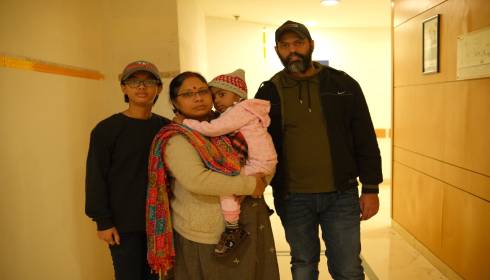
Fecal microbiota transplant saves child, who had stool frequency of up to 30 times a day
Doctors at a Delhi hospital managed to give a new lease of life to two-year-old child, who was suffering from uncontrolled diarrhea, by carrying out fecal microbiota transplant, a procedure in which normal stool from a healthy person is put into the intestine of the patient.
Daksh Singh, the patient, stool frequency normalized six days after fecal transplant with clearance of deadly bacteria.
He had uncontrolled diarrhea after bone marrow transplant (BMT) for acute myeloid leukemia.
Daksh was suffering from an extreme case of diarrhea with stool frequency of up to 30 times a day. When his stool was analyzed, the doctors found a bacteria called Clostridium difficile.
Due to severe diarrhea, the normal flora of the gut got disturbed. This led to recurrent dehydration, weakness and loss of appetite.
Uncontrolled diarrhea can become life threatening due to loss fluids and essential micronutrients from the body. The doctors tried to treat his diarrhea through antimicrobials, and other supportive treatment however, nothing helped.
Dr Rahul Naithani, Director - Bone Marrow Transplantation and Clinical Hematology at Max Hospital, Saket said, “Diarrhea is a common side effect after bone marrow transplant but it is usually brought under control with routine medications. However, Daksh’s condition did not improve despite medication. We then decided to perform fecal microbiota transplant. We explained the procedure to the family and they decided to go ahead. Daksh’s sister Palak, who was also his BMT donor, became a donor for FMT as well.”
In fecal transplant, the good bacteria from a healthy donor are transplanted to the recipient after which the freshly introduced good bacteria colonizes in the intestine and further helps in regaining the lost healthy normal flora and modifies the recipient’s defense mechanism and helps to recover.
Dr Vikram Kumar, Principal Consultant, Paediatric Liver Transplant, Gastroenterology and Hepatology, Max Hospital, Saket explained, “For FMT, fresh stool of the healthy donor is blended with saline, distilled, and inserted in the intestine with endoscopy. Our intestine harbors billions of bacteria. These bacteria play an active role in maintaining our health. Through FMT, we introduce good, healthy bacteria into the colon which then changes the microbial community and helps in rebuilding a healthy gut.”